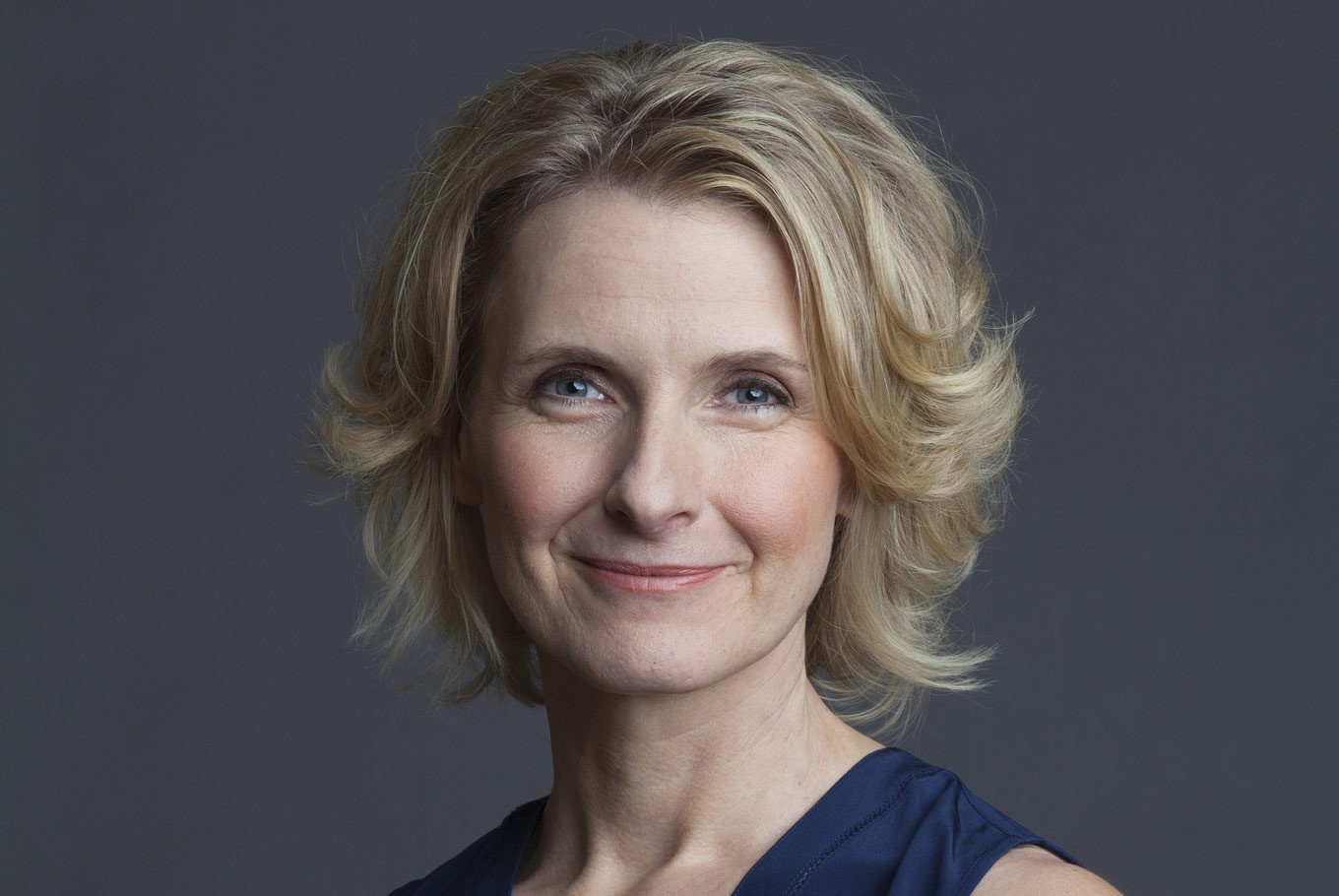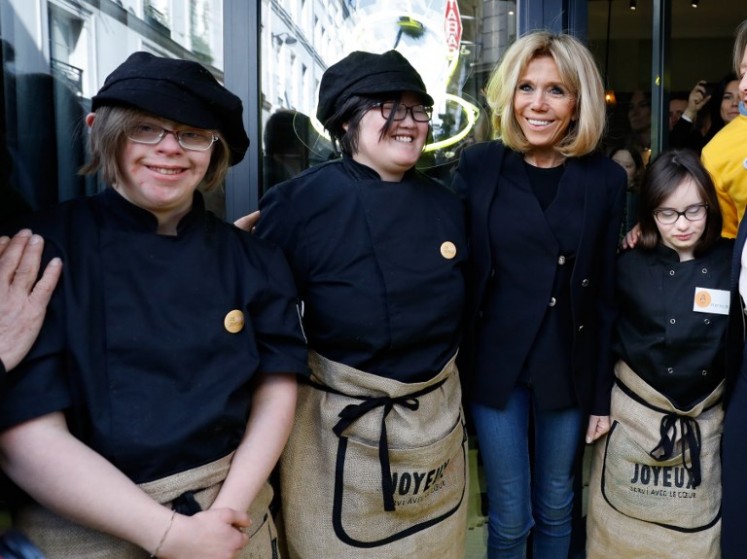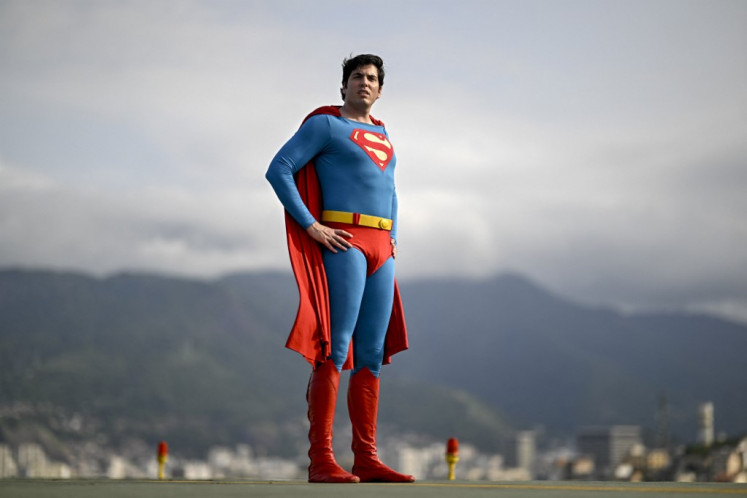‘Eat Pray Love’ liberated me, says author
Elizabeth Gilbert chatted to "The Jakarta Post" on her life, happiness and white privilege.
Change Size
 Elizabeth Gilbert, author of bestselling memoir 'Eat Pray Love' (Elizabeth Gilbert/Timothy Greenfield-Sanders)
Elizabeth Gilbert, author of bestselling memoir 'Eat Pray Love' (Elizabeth Gilbert/Timothy Greenfield-Sanders)
T
welve years after its release, Eat Pray Love now has a life on its own. The book, which is both celebrated and criticized for its story and message, had been adapted as a movie starring Julia Roberts and Javier Bardem, arguably helping to put Ubud on the map, not to mention spawning countless catchy quotes echoing the title.
“It liberated me,” said Elizabeth Gilbert on the success of the book. Before Eat Pray Love, Gilbert had to work many jobs to support herself as a writer. The success of the memoir afforded a financial cushion to follow [her] curiosity in any direction. For one, the ability to take four years off from work and travel the world to research her novel The Signature of All Things (2013).
Gilbert has also written two memoirs following Eat Pray Love, Committed: A Skeptic Makes Peace with Marriage (2010) and Big Magic: Creative Living Beyond Fear (2015). A new edition of Eat Pray Love is available exclusively on Periplus. Her latest book, City of Girls, will be out in June.
Gilbert chatted to The Jakarta Post via email on her life, happiness and white privilege.
How much has life changed since Eat Pray Love? Do you think you'll ever go on another self-discovery journey again?
My life is constantly changing, and I expect that it will keep doing so for as long as I’m alive -- just like yours does, just like anyone’s does. It seems to be the universal contract of existence, that life will never stop changing. We live on a very shifty planet, in very shifty bodies, with very shifty minds. All evidence seems to support that change is the way of things, around here.
I always try to remind people that my life did not end on the last page of Eat Pray Love. Books end; lives go on. Since the day I wrote the last page of Eat Pray Love, I got married, got divorced, fell in love with my best friend (Rayya Elias), and nursed her through terminal cancer diagnosis, staying with her until the end of her life. During that time, I’ve also written four more books. I’ve traveled to new places, moved houses several times, lost friends and made friends.
As for going on another self-discovery journey, the truth is that I don’t think I’ve ever stopped going on journeys of self-discovery. Every time our lives change, or the world changes, we have to adjust our thinking, and try to keep up with the transformations. I am always seeking new teachers, new ways of understanding, and new worlds to discover -- both internally and externally. I’m not sure if I’ll ever take another year-long literal journey, like I did with Eat Pray Love, but this year alone I’ve already gone on several retreats and a few overseas trips, and I’ve found new teachers and new practices to help deepen my understanding of the world and of myself. The journey never ends, is I guess what I’m saying.
In the way that Rome is sex in Eat Pray Love, what is your word today?
Freedom. I am fascinated by anyone who ever chooses freedom over security. It’s not easy for women to be free. Thousands of years of culture directs women toward sacrificing themselves for others, and putting yourself last. The standard definition of a “good woman”, you could argue, is somebody who gives herself away -- quietly and obediently and completely. But I don’t want to give myself away.
And I have surrounded myself lately with a number of stubborn and interesting women who have also decided (in various ways) not to give themselves away. We insist on being free. The writers Martha Beck and Glennon Doyle are among them. We have decided not to quietly drown ourselves in martyrdom. We stubbornly follow our joy, and we serve only the people and causes that we choose to love and support. We hold ourselves accountable to integrity above all. Our motto is, “Now that we don’t have to be good, we can be free.” (Of course, we are still “good”, but we are good on our own terms -- not the terms that culture has handed down to us.)
I’m thrilled and inspired by those women, and I want to take my own experience of female freedom as far as I possibly can. I’ve trimmed down my life a great deal, with the idea that I don’t want anything around me except that which I really need, and that which makes me feel joyful and inspired. I want to stretch my independence as far as I am able. No woman in the history of my family was ever able to do this before, so I also feel that I am experiencing my freedom on behalf of them, whose lives were so often confined.
Read also: Reni Eddo-Lodge: Sticking around to talk about race
You mention that meditation is how you subdue your ego, but your book largely focuses on self-love and happiness. This might seem to be contradictory to some people. Can you elaborate?
The more you can subdue your ego, the more you will find self-love and happiness. The self-love that I’m seeking is not to be found through treating myself to a trip to a spa, or a shopping trip, or a new car. The self-love that I seek is an unconditional kindness and friendliness toward myself, as a human being.
I want to offer myself, at the least, the same basic level of sympathy and goodwill that I would offer to any stranger who I see suffering. I no longer have the appetite to attack myself -- especially not when I am suffering. It feels inhumane to attack myself -- the same way it would feel inhumane for me to attack you, if you were suffering. I used to turn on myself viciously whenever I made a mistake, or felt a sense of shame and failure. Nobody in the world has ever been able to hurt me as much as I hurt myself when I believe the voice in my head that tells me I’m a loser and a failure. So I don’t believe that cruel internal voice anymore.
I have learned through my spiritual practices how to quietly and kindly watch those thoughts, without getting hooked by them. I have come to believe that those hateful thoughts are just my ego trying to get my attention by causing a commotion. Beyond all the clatter and the noise, I know that I have a precious soul that wants to be at peace, and wants to feel connected and loved. The fact is: It is a dilemma to be alive. It’s a dilemma for everyone. The way I feel about myself these days is, “I’ve come this far with you, Liz -- I’m not going to start turning against you now.” So I make it a priority to be kind to myself.
Again -- this doesn’t mean spoiling myself, or treating myself like a princess. It just means that I believe I am entitled to a certain degree of quiet mercy, and so is everyone else. I have learned to hold my own hand with kindness during the storms of life, and the storms of my own mind. In years of quiet searching, I have decided that the very least we owe to every living being is a sense of mercy, for how difficult and confusing life can be. And I am included in the category of “every living being”. My feeling is that: If I don’t deserve mercy, then nobody else does, either. (Because why should I be the exception?) And if we live in a world where nobody deserves mercy, then we don’t have to worry about going to hell someday, because we are already there. The way to make hell into heaven is through universal mercy. You can do that now, on this earth, in this lifetime. Mercy is the portal to peace. But mercy starts at home. Begin by offering it to yourself.
Do you think that Eat Pray Love would have faced huge criticism about white privilege had social media existed back then?
Absolutely. Even without social media, Eat Pray Love faced huge criticism of having white privilege. And it’s a worthwhile criticism. This conversation about privilege is important and well overdue. I am a woman whose race has given me outrageous advantages in a white-dominated world, and I possess social privilege, too. (I wasn’t raised in a wealthy household, but I was fortunate enough to be born into an affluent society, at one of the few times and places in history when a woman could be educated, and could have control over her financial life, and could have political and creative power.)
I’ve tried to use my privilege as responsibly as I can -- making sure that I work hard, create boldly, share what I’ve been given, and use my platform to help and teach people. But there is no doubt that I’ve been enormously blessed.
That said: What interests me about Eat Pray Love is not the racial or social background of the woman who wrote it, but the racial and social background of the women who read it. This book was embraced by literally millions of women all around the world -- from different backgrounds, of different races, of different ages, speaking different languages, with different levels of socioeconomic privilege. The book sold just as well in the Middle East as it did in Africa, Southeast Asia and Eastern Europe. There are women who read that book who wear burkas, and women who are in arranged marriages, and women who come from various fundamentalist and conservative backgrounds. This book has been read by women in prison, and women serving as soldiers in wars.
One night at a bookstore in Oklahoma, I met a woman in her seventies who told me that Eat Pray Love was the first book she had ever read in her entire life. (I’ve never been more proud than at that moment -- to have written the first book that a grown woman ever read.) She and I had absolutely nothing in common, but she had found my book, and it had spoken to her. It had given her the courage to leave her abusive marriage. She had never considered, before reading this book, that her life belonged to her. This was a brand new idea for her. She was never going to have the means to go traveling around the world, but she did have the courage to strike out on her own, once she realized that her life belonged to her.
This was the shocking message that Eat Pray Love delivered to so many women: Your life belongs to you. So that’s what I always want to tell people about Eat Pray Love -- that the interesting story here is not me, but them. It doesn’t matter who I am. What matters is who those 12 million female readers were, and how the book inspired them. (wng)









